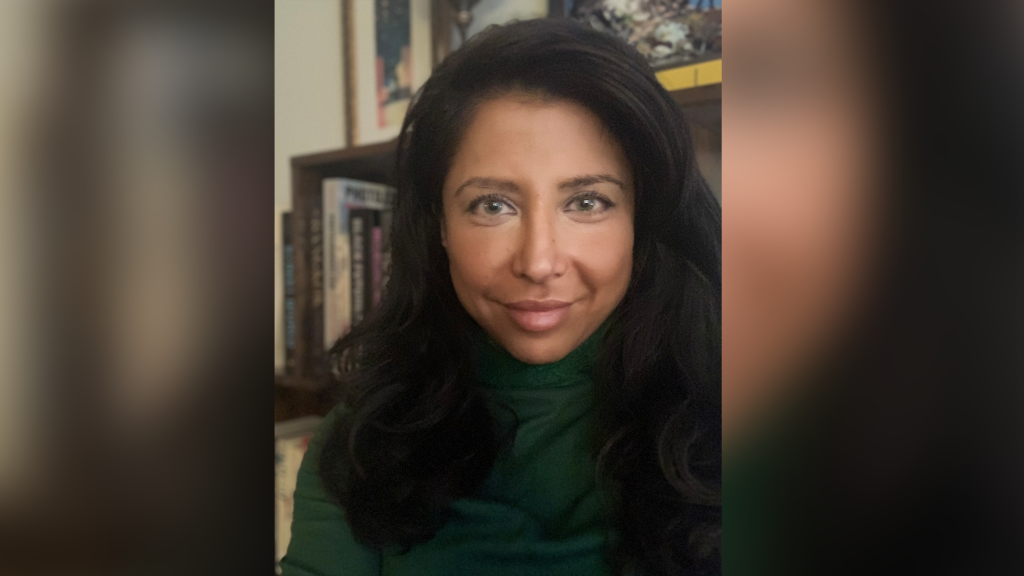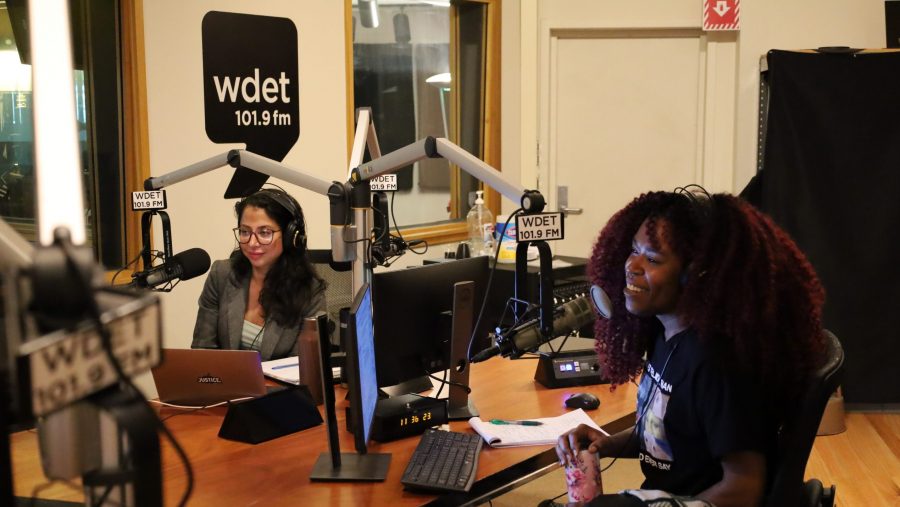Award-winning journalist Robyn Vincent joins ‘The Metro’ as co-host alongside Tia Graham
Maleia Brown October 21, 2024Tia Graham sits down with Robyn Vincent to discuss how she got her start in public radio and her journey back to Detroit.

Robyn Vincent is the new co-host of "The Metro" on WDET.
This week, Tia Graham welcomes Robyn Vincent as the new co-host of The Metro.
Vincent is an award-winning journalist, lifelong listener of WDET and a graduate of Wayne State University, where she studied journalism.
Most recently working as a reporter for Chalkbeat Detroit, Vincent served as a reporter, producer, editor and executive producer for NPR stations in the Mountain West before returning home to Detroit. She was also the editor-in-chief of an alternative weekly newspaper in Wyoming — leading the paper to win its first national award for a series she directed tracing one reporter’s experience living and working with Syrian refugees.
The daughter of an Iraqi immigrant, Vincent’s work often dispels notions of “the other,” she says.
At the Mountain West News Bureau — a consortium of NPR stations across six states — she identified a coverage gap and created the bureau’s first inequality beat. At KUNC in Colorado, she was an inaugural member of the station’s investigative desk and helped launch a daily news show and podcast for which she was the executive producer.
Graham and Vincent sat down before their first show to discuss her journey back to Detroit and share her excitement about joining The Metro as a permanent host.

Listen: Robyn Vincent discusses how she got into public radio and what it means to be back in Detroit
The following interview has been edited for clarity and length.
Robyn Vincent: I was working for a newspaper. This was back in Wyoming. I was leading it as its editor, and I had always had these whispers in the back of my head that radio is where I really wanted to be. I would listen to NPR, and just think like, “Oh, that is so dynamic.” It’s so alive, in a way that print just isn’t, right? You hear the emotion in people’s voices, and there’s just something so compelling about radio that gets lost in print. I started a podcast for this newspaper that I was running, and the more of that work that I did, I realized, “Oh yes, this is what it’s about.”
I went on then to convince the board of directors for a small radio station in Wyoming that they needed a news department. This was a more music format station with some talk. I said, “Hey, this is kind of a news desert. Now, there are not enough newspapers here. There are not enough publications that are elevating the voices that we’re not typically hearing, the more marginalized voices — folks who are a part of the story, but aren’t being heard.” And so, the board of directors, they were self-proclaimed music lovers, but they acquiesced to me and allowed me to build this news department at this radio station.
And then from there, I was working for NPR stations across the Mountain West and loving life doing that, and I started then working as an investigative reporter for one of those stations, and then I helped them launch and lead a daily news show and podcast. But this whole time, Detroit was calling me back.
Tia Graham: You recently moved back to metro Detroit. You’re living in the city of Detroit right now. What is it like being back home?
RV: I don’t want to get too emotional. You’re such a great interviewer. You get right at the heart of things, Tia. Every day I’m grateful. Every day I am just walking around and seeing changes in our city and feeling hopeful and interacting with people who are so passionate. The way that I describe it to people, my friends back in the Mountain West in Colorado, I say there’s just this palpable energy here. There’s nothing else like Detroit.
TG: It’s a pulse there in the city of Detroit. And like you said, that hope is something that I haven’t felt in a long time, being a Detroiter and feeling it again. It’s just been amazing, and it’s been even more rewarding that we get to talk about that type of stuff on The Metro every single day, that the growth and different things that we see happening. But also, I think about the things that you are looking to bring to The Metro and the things that you want to talk about. So, what are some of the things that you are excited to dig into, especially as the new co-host of The Metro?
RV: Yeah, I think that examining what Detroit’s so-called rebirth means for a lot of different communities is important. And I know that’s something that you have already been doing and I am really interested in doing that too, certainly from a systemic lens. Some of the previous investigative work I did looked at abuses of power when it comes to law enforcement, for example, or the ways in which certain communities are still really paying for the historical wrongs of the past. In the Mountain West, that meant looking at a lot of the struggles that Native Americans were facing, a lot of different tribal folks. And so, I think it’s going to be about a lot of the stuff that you’re already doing that we’re going to do more of, which is like peeling back the layers and really interrogating who’s getting left behind right now as we celebrate this energy, what’s happening in the city? What else needs to be done, and how do we shine a light on that in the hope that we can see things become better?
Listen to The Metro weekdays from 11 a.m. to noon ET on 101.9 FM and streaming on-demand.
Trusted, accurate, up-to-date.
WDET strives to make our journalism accessible to everyone. As a public media institution, we maintain our journalistic integrity through independent support from readers like you. If you value WDET as your source of news, music and conversation, please make a gift today.
